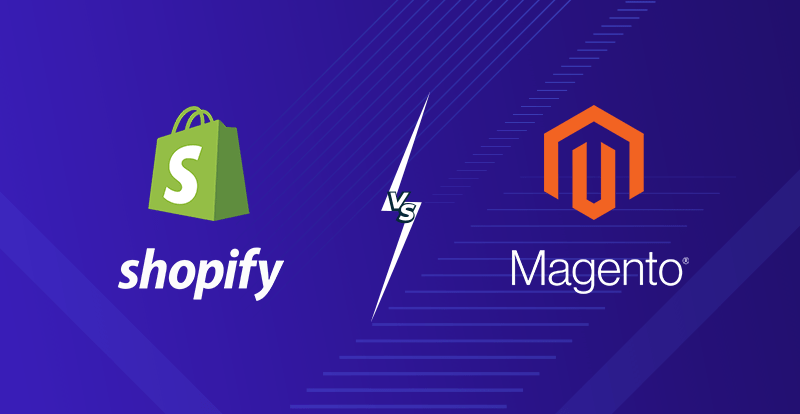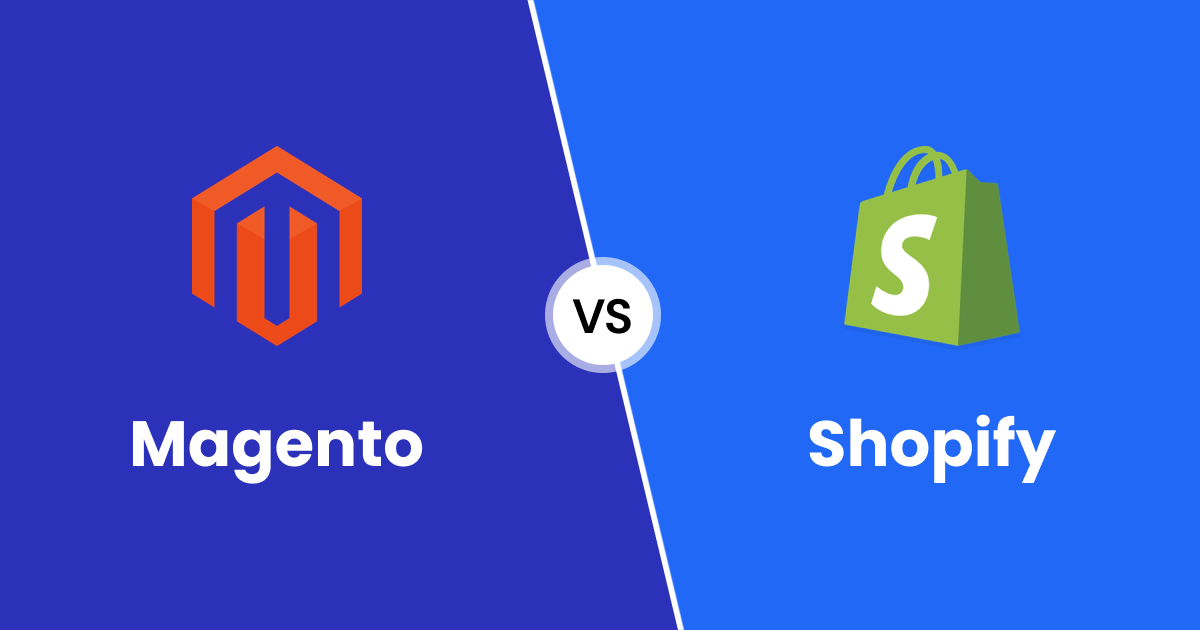Magento vs. Shopify: Which E-commerce Solution Should You Choose?
As a business it’s very crucial to choose an e-commerce platform. Picking a platform that works for everyone is your first priority. Are you already midway through making a critical decision when selecting the platform? If you need help to decide between Magento and Shopify this guide is for you.
Before we start this E-commerce solution comparison here is a brief review. Both offer unique features and functionalities. Both powerhouses have already shaped the online retail industry well. Comparing a better one between Magento vs Shopify won’t be easy. As they have helped countless entrepreneurs and businesses launch their digital stores. Also they have engaged with customers worldwide.
TheNerdSeries will help you with features ease of use scalability pricing and support offered by Magento and Shopify. Choosing one over the other is challenging since each has its own set of advantages and disadvantages. In this blog post we will dive deep into the features ease of use scalability pricing and support of Magento and Shopify. So let’s evaluate these factors side by side. It will help you decide which of these popular e-commerce solutions aligns best with your business needs technical expertise and budget.
So let’s explore the intricacies of Magento vs. Shopify and discover the perfect e-commerce solution for your digital venture.
Overview of Magento and Shopify
Magneto:
- Magneto an e-commerce platform is owned by Adobe. It works as an SEO-friendly CMS. It has hundreds of unique features for users. These features help website owners connect with customers and sell products quickly. It launched in 2007 and used to be called Adobe Commerce. The program which is built on PHP is well-known for its many features adaptability and capacity to scale.
Shopify:
- You can sell things online using Shopify. With Shopify even the smallest enterprises can set up shop online and start selling products. Using its simplified interface sellers may set up shop on several platforms including social media marketplaces blogs websites and even email text and chat. The ability to sell in person is further simplified by having an integrated point-of-sale system for brick-and-mortar businesses pop-up shops and market stalls.

Features Comparison
Magento and Shopify are both very feature-rich e-commerce platforms. You may construct and administer your online shop more efficiently with the aid of these capabilities. Let’s have a detailed description and compare them.
Customizability:
- Magento: It gives you much control over how your store looks works and customers interact with it. You can use custom styles and apps and access the platform’s code which makes Magento very flexible.
- Shopify: offers a variety of styles you can change and provides an easy-to-use interface for modifying the appearance and feel of your store. On the other hand Magento allows for much more customization particularly in the realm of sophisticated features.
SEO:
- Magento: allows users to change advanced SEO features like URLs meta tags and rich snippets. It also works with Google AMP (Accelerated Mobile Pages) and has more SEO-focused apps.
- Shopify: includes built-in SEO tools such as URLs title tags and meta descriptions that users can change. However it has fewer powerful SEO features than Magento.
Product Management:
- Magento: Allows many product entries customized products and different versions of goods. It also lets you set group prices make wish lists and do more advanced searches for products.
- Shopify: Allows you to make and handle goods including keeping track of supplies offering adjustable product choices and putting together product groups. It lets you add many products simultaneously but it might not be as flexible as Magento in terms of complex product settings.
Integrations:
- Magento: Allows a lot of different third-party systems to connect like shipping services payment methods marketing automation tools and CRM systems. Because it is an open-source coders can also make their connections.
- Shopify: Allows you to connect to well-known third-party apps and services like shipping and payment services as well as marketing tools. It has a well-known app shop that makes it easy to find new apps and adds extra features to your store. However Magento may have fewer connections than it does especially for more specific needs.
Magento lets you change how your online store works but you usually need to work with a developer. Shopping Cart has solid tools for managing content advertising and changing the user interface. Shopify’s apps bring in more customers and make more sales while Magento has a lot of SEO tips and tools. Magento and Shopify are both fully managed fixed-price systems for managing products that are easy for anyone to use. Both Magento and Shopify offer a wide range of tools and customization choices.
Comparing Ease of Use
Magento User Experience:
Although Magento is an effective technology mastering it requires significant time and effort. Even for very tech-savvy individuals the user experience could be a bit of a mystery. But this level of complexity also gives you a lot of freedom and power over your online business. Key points include:
- Administrative Interface: Magento's backend has many features but it can be challenging for new users to find their way around. You should get used to all the settings and choices.
- Customization: Magento lets users who know how to code or have access to developers make their store fit their needs in many different ways.
- Setup and Configuration: Setting up a Magento store can take a lot of time and be hard to understand if you need to learn more about computers.
Shopify User Experience:
Shopify has been made easy for anyone to use. Because of this it's a great option for those whose level of technical expertise varies. Important points are:
- Administrative Interface: The backend of Shopify is user-friendly clear and simple to get around. Both new and expert users will find it helpful.
- Customization: Shopify lets you change the way your store looks and feels with several styles that can be changed and an easy-to-use interface. It also has a drag-and-drop website maker that lets people who need to be tech-savvy make stores look professional.
- Setup and Configuration: Thanks to its guided setup process and easy-to-use interface Shopify makes setting up and configuring a store quick and straightforward.
Shopify is more accessible for people with different technical knowledge levels. At the same time Magento might be better for people with more advanced technical knowledge or access to development tools.

Comparing Shopify vs Magento Scalability
Magento Scalability:
Magento is known for being easy to expand so it works well for businesses that want to increase or are already running extensive operations. Some key points include:
- Performance: Magento is made to handle extensive catalogs of products lots of visitors and stores with complicated layouts without slowing down.
- Customization and Control: As your business grows Magento gives you more control and customization options over how your store works so you can meet your customers' changing needs.
- Enterprise Edition: Magento has a version called "Enterprise" with extra features and help for big businesses. Companies who need room to expand will find it to be an excellent fit.
Shopify Scalability:
Shopify is made to work with businesses of all kinds and it can grow with your company as it does. Key points include:
- Performance: Because its technology is in the cloud and its platform is optimized Shopify's speed is stable and can handle a lot of traffic and sales.
- Seamless Upgrades: Shopify handles platform updates and support so your store stays up-to-date and works well even as your business grows.
- Shopify Plus: Shopify has an enterprise-level option called Shopify Plus for big businesses. It gives them more ways to customize and grow and committed support.
Magento is an e-commerce engine that lets you add more stores makes building pages easy and supports many types of content. With its ability to handle diverse products and robust content management capabilities this platform is ideal for launching an e-commerce store. Shopify provides a range of integrated features that are easy to use.
Pricing Differentiation Between Shopify and Magento
Magento Pricing:
- Open Source Edition: The Open Source version is available at no cost to you. You will have to pay for hosting anywhere from $10 to $500 or more a month based on how big your store is and how many people visit it. Things like themes plugins and software services may cost extra.
- Commerce Edition: This is Magento's cloud-based service that costs money. Plans start at about $2000 per month. Your company's requirements sales volume and size all have a role in the final cost. The Commerce version has more advanced tools cloud storage and exceptional help.
- Transaction Fees: You don't have to pay fees to use Magento. However the payment method you choose may charge you fees.
Shopify Pricing:
- Basic Shopify: Hosting an SSL certificate and customer service are all included for as little as $29 a month. This plan works well for companies that only make a few sales and have few staff accounts.
- Shopify: For $79 a month it has more features like professional reports more staff accounts and lower transaction fees.
- Advanced Shopify: At $299 a month this plan has the lowest transaction fees and the most advanced tools such as a report maker and third-party shipping rates.
- Shopify Plus: Big companies and firms with a lot of sales may get special pricing.
- Transaction Fees: Without Shopify Payments you'll be liable for paying transaction costs levied by Shopify. Depending on your plan these fees range from 0.5% to 2%.
Return on Investment (ROI) Analysis:
- Magento: At first glance Magento's open-source version may seem like a good deal but it needs skilled development and upkeep leading to higher long-term costs. The Commerce version is better for more prominent companies because it has more advanced features and better customer service. This means that companies with complicated needs can get a higher return on their investment.
- Shopify: Shopify's monthly plans help businesses figure out how much they will have to pay over time. Its intuitive design and large app environment also help sellers quickly set up and improve their stores which makes it a good choice for companies that want a mix of functionality and usability.
In the end the possible ROI for each platform relies on the needs sales rate and growth potential of your business. Check out both platforms' features scaling and price methods to see which is the best deal for your needs.

Support and Community Comparison
Customer Support
Magento:
- Open Source Edition: You don't get dedicated support from Magento for open source. So you have to rely on hiring third-party developers for technical assistance. Otherwise you can seek help from the Magento community and forums.
- Commerce Edition: Magento's Commerce Edition provides 24/7 technical support. They will help you in account management as well as the onboarding process. You will also get a help center documentation and community resources.
Shopify:
- All Plans: With Shopify plans you get 24/7 customer support. Live chat email and phone are the ways to interact with them. Additionally all documentation forums support centers and a community of developers and specialists are easily accessible.
- Shopify Plus: With its premium plan Shopify plus you got a relationship manager and launch manager.
Developer Communities Forums and Resources
Magento:
- Official Forums: Magento's official forums have a thriving community. Users and developers alike may post questions provide advice and talk about anything and everything having to do with Magento.
- Magento Stack Exchange: Get answers and discuss technical Magento-related topics in our developer community.
- Documentation and Resources: Magento offers a wealth of resources on its website including documentation user guides and development resources. They also provide tutorials webinars and training programs.
Shopify:
- Shopify Community: Join our community platform to connect with Shopify users developers and experts. Participate in conversations pose inquiries and exchange materials.
- Shopify Partners: Our platform provides everything Shopify developers and experts need to build and customize Shopify stores. Access documentation training materials discussion forums and resources in one place.
- Documentation and Resources: Shopify's website has a lot of helpful information for coders artists and sellers such as thorough instructions API references and lessons.
To sum up Magento and Shopify offer different customer support. However Magento's Commerce version and Shopify's paid plans offer more advanced and personalized help. Both platforms also have busy developer groups boards and other tools that users and devs can use to get help share information and work together on e-commerce solutions.
Conclusion
Finally it is not easy to choose the best e-commerce platform for your company. The success and visibility of your online presence are heavily dependent on your choice. Two of the most well-known e-commerce platforms in 2024 are Shopify and Magento. These platforms had a variety of features for different users. Carefully consider each unique advantage and determine if anything impacts your business. For more details on Shopify and Magneto you can check TheNerdSeries. We provide a detailed analysis of e-commerce platforms and help you choose a better one.
Larger companies with complicated needs and a need for advanced modification and control should use Magento. Its open-source design ability to grow and many features make it an excellent choice for businesses that want to create a custom online store. While these perks are nice they may come with a longer learning curve and higher costs for growth and maintenance.
Shopify on the other hand has a website that is easy to access and use and its price plans can be changed to fit the needs of businesses of all kinds from small starts to large corporations. Because it is simple easy to use and has a lot of apps sellers can quickly set up and improve their online shops. Shopify may be more flexible or offer more advanced features than Magento which could be problematic for businesses with particular needs.
